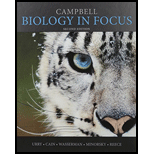
Campbell Biology in Focus; Modified Mastering Biology with Pearson eText -- ValuePack Access Card -- for Campbell Biology in Focus (2nd Edition)
2nd Edition
ISBN: 9780134433776
Author: Lisa A. Urry, Michael L. Cain, Steven A. Wasserman
Publisher: PEARSON
expand_more
expand_more
format_list_bulleted
Question
Chapter 35.3, Problem 2CC
Summary Introduction
To determine:
The cells and functions that would be deficient, if child were born without a thymus. Determine the functions do cell-surface antigen receptors fulfill for memory B-cells.
Introduction:
The thymus is a gland which is responsible for the development of T-cells which are one of the important types of white blood cells and play an important role in the immune system.
Expert Solution & Answer
Want to see the full answer?
Check out a sample textbook solution
Students have asked these similar questions
What is the label ?
Can you described the image? Can you explain the question as well their answer and how to get to an answer to an problem like this?
glg 112 mid unit assignment Identifying melting processes
Chapter 35 Solutions
Campbell Biology in Focus; Modified Mastering Biology with Pearson eText -- ValuePack Access Card -- for Campbell Biology in Focus (2nd Edition)
Ch. 35.1 - Pus is both a sign of infection and an indicator...Ch. 35.1 - MAKE CONNECTIONS How do the molecules that...Ch. 35.1 - Prob. 3CCCh. 35.2 - Prob. 1CCCh. 35.2 - Explain how memory cells strengthen the immune...Ch. 35.2 - WHAT IF? If both copies of a light-chain gene and...Ch. 35.3 - Prob. 1CCCh. 35.3 - Prob. 2CCCh. 35.3 - Prob. 3CCCh. 35 - Prob. 1TYU
Ch. 35 - Prob. 2TYUCh. 35 - Prob. 3TYUCh. 35 - Prob. 4TYUCh. 35 - Prob. 5TYUCh. 35 - Prob. 6TYUCh. 35 - Prob. 7TYUCh. 35 - DRAW IT Consider a pencil-shaped protein with two...Ch. 35 - MAKE CONNECTIONS Contrast clonal selection with...Ch. 35 - Prob. 10TYUCh. 35 - FOCUS ON EVOLUTION Describe one invertebrate...Ch. 35 - Prob. 12TYUCh. 35 - Prob. 13TYU
Knowledge Booster
Similar questions
- Explain how the hormones of the glands listed below travel around the body to target organs and tissues : Pituitary gland Hypothalamus Thyroid Parathyroid Adrenal Pineal Pancreas(islets of langerhans) Gonads (testes and ovaries) Placentaarrow_forwardWhat are the functions of the hormones produced in the glands listed below: Pituitary gland Hypothalamus Thyroid Parathyroid Adrenal Pineal Pancreas(islets of langerhans) Gonads (testes and ovaries) Placentaarrow_forwardDescribe the hormones produced in the glands listed below: Pituitary gland Hypothalamus Thyroid Parathyroid Adrenal Pineal Pancreas(islets of langerhans) Gonads (testes and ovaries) Placentaarrow_forward
- Please help me calculate drug dosage from the following information: Patient weight: 35 pounds, so 15.9 kilograms (got this by dividing 35 pounds by 2.2 kilograms) Drug dose: 0.05mg/kg Drug concentration: 2mg/mLarrow_forwardA 25-year-old woman presents to the emergency department with a 2-day history of fever, chills, severe headache, and confusion. She recently returned from a trip to sub-Saharan Africa, where she did not take malaria prophylaxis. On examination, she is febrile (39.8°C/103.6°F) and hypotensive. Laboratory studies reveal hemoglobin of 8.0 g/dL, platelet count of 50,000/μL, and evidence of hemoglobinuria. A peripheral blood smear shows ring forms and banana-shaped gametocytes. Which of the following Plasmodium species is most likely responsible for her severe symptoms? A. Plasmodium vivax B. Plasmodium ovale C. Plasmodium malariae D. Plasmodium falciparumarrow_forwardStandard Concentration (caffeine) mg/L Absorbance Reading 10 0.322 20 0.697 40 1.535 60 2.520 80 3.100arrow_forward
arrow_back_ios
SEE MORE QUESTIONS
arrow_forward_ios
Recommended textbooks for you
 Human Physiology: From Cells to Systems (MindTap ...BiologyISBN:9781285866932Author:Lauralee SherwoodPublisher:Cengage Learning
Human Physiology: From Cells to Systems (MindTap ...BiologyISBN:9781285866932Author:Lauralee SherwoodPublisher:Cengage Learning Human Biology (MindTap Course List)BiologyISBN:9781305112100Author:Cecie Starr, Beverly McMillanPublisher:Cengage Learning
Human Biology (MindTap Course List)BiologyISBN:9781305112100Author:Cecie Starr, Beverly McMillanPublisher:Cengage Learning Concepts of BiologyBiologyISBN:9781938168116Author:Samantha Fowler, Rebecca Roush, James WisePublisher:OpenStax College
Concepts of BiologyBiologyISBN:9781938168116Author:Samantha Fowler, Rebecca Roush, James WisePublisher:OpenStax College Biology (MindTap Course List)BiologyISBN:9781337392938Author:Eldra Solomon, Charles Martin, Diana W. Martin, Linda R. BergPublisher:Cengage Learning
Biology (MindTap Course List)BiologyISBN:9781337392938Author:Eldra Solomon, Charles Martin, Diana W. Martin, Linda R. BergPublisher:Cengage Learning Anatomy & PhysiologyBiologyISBN:9781938168130Author:Kelly A. Young, James A. Wise, Peter DeSaix, Dean H. Kruse, Brandon Poe, Eddie Johnson, Jody E. Johnson, Oksana Korol, J. Gordon Betts, Mark WomblePublisher:OpenStax College
Anatomy & PhysiologyBiologyISBN:9781938168130Author:Kelly A. Young, James A. Wise, Peter DeSaix, Dean H. Kruse, Brandon Poe, Eddie Johnson, Jody E. Johnson, Oksana Korol, J. Gordon Betts, Mark WomblePublisher:OpenStax College

Human Physiology: From Cells to Systems (MindTap ...
Biology
ISBN:9781285866932
Author:Lauralee Sherwood
Publisher:Cengage Learning

Human Biology (MindTap Course List)
Biology
ISBN:9781305112100
Author:Cecie Starr, Beverly McMillan
Publisher:Cengage Learning

Concepts of Biology
Biology
ISBN:9781938168116
Author:Samantha Fowler, Rebecca Roush, James Wise
Publisher:OpenStax College

Biology (MindTap Course List)
Biology
ISBN:9781337392938
Author:Eldra Solomon, Charles Martin, Diana W. Martin, Linda R. Berg
Publisher:Cengage Learning

Anatomy & Physiology
Biology
ISBN:9781938168130
Author:Kelly A. Young, James A. Wise, Peter DeSaix, Dean H. Kruse, Brandon Poe, Eddie Johnson, Jody E. Johnson, Oksana Korol, J. Gordon Betts, Mark Womble
Publisher:OpenStax College
